PISA Examination in Bhutan: Opportunities and Challenges
VerifiedAdded on 2021/06/14
|24
|5504
|95
Report
AI Summary
This report presents an analysis of the PISA examination in Bhutan, focusing on the opportunities and challenges presented by its participation in the Programme for International Student Assessment (PISA). The study delves into the background of PISA-D and its benefits, exploring the context of Bhutan's involvement since 2017. It reviews the literature on PISA-D, its impact on educational policy, and the trends in the global education system, including positive education and international testing systems. The methodology includes a descriptive survey design with questionnaires distributed to students, teachers, and principals. The research questions address perceptions, challenges faced by the Bhutan Council for School Examination and Assessment (BCSEA), and the benefits of participation. The report also includes a timeline, budget, and ethical considerations, offering a comprehensive overview of the research proposal. The study aims to contribute to a better understanding of the impact of PISA on the Bhutanese education system, informing potential school reforms and policy developments.
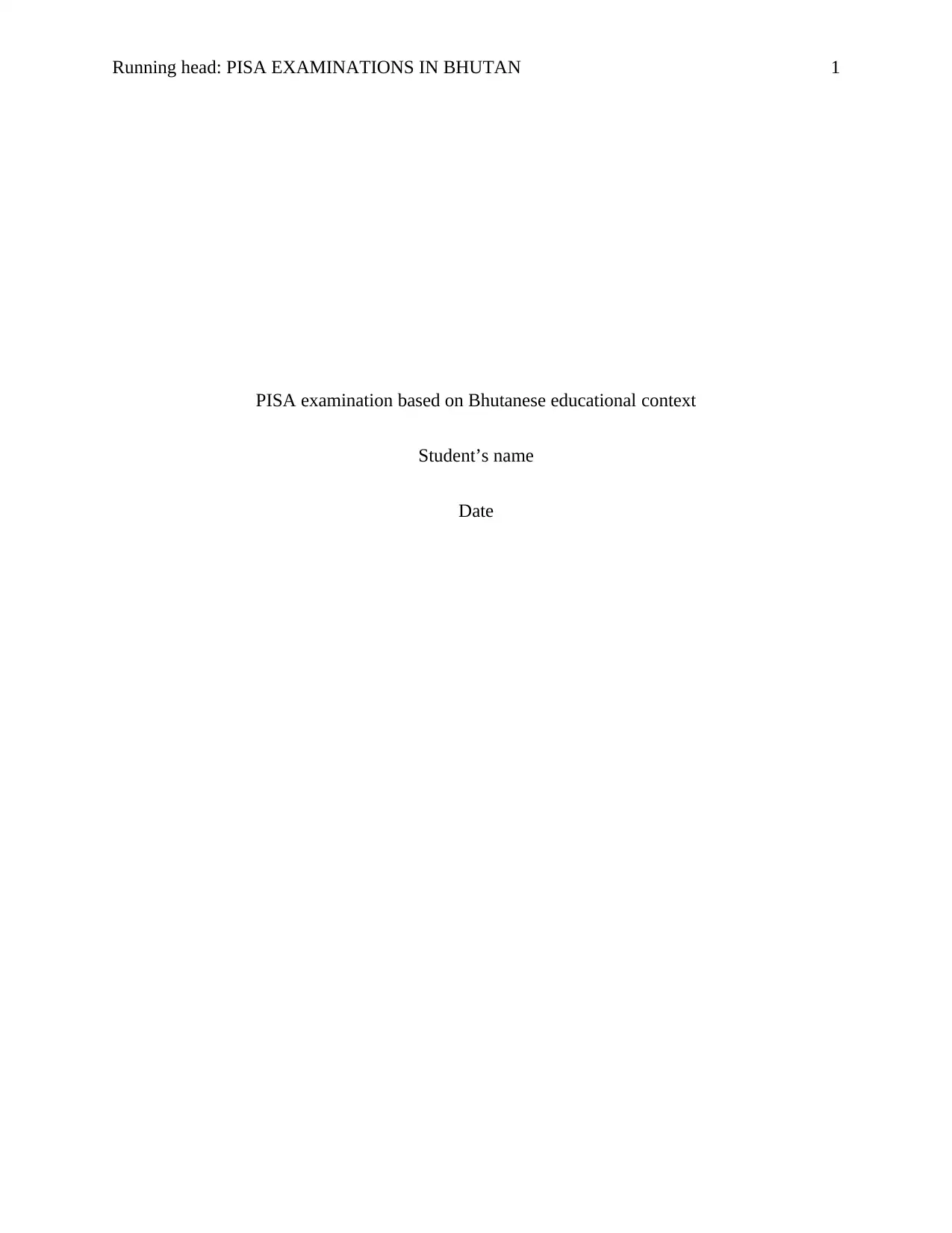
Running head: PISA EXAMINATIONS IN BHUTAN 1
PISA examination based on Bhutanese educational context
Student’s name
Date
PISA examination based on Bhutanese educational context
Student’s name
Date
Paraphrase This Document
Need a fresh take? Get an instant paraphrase of this document with our AI Paraphraser
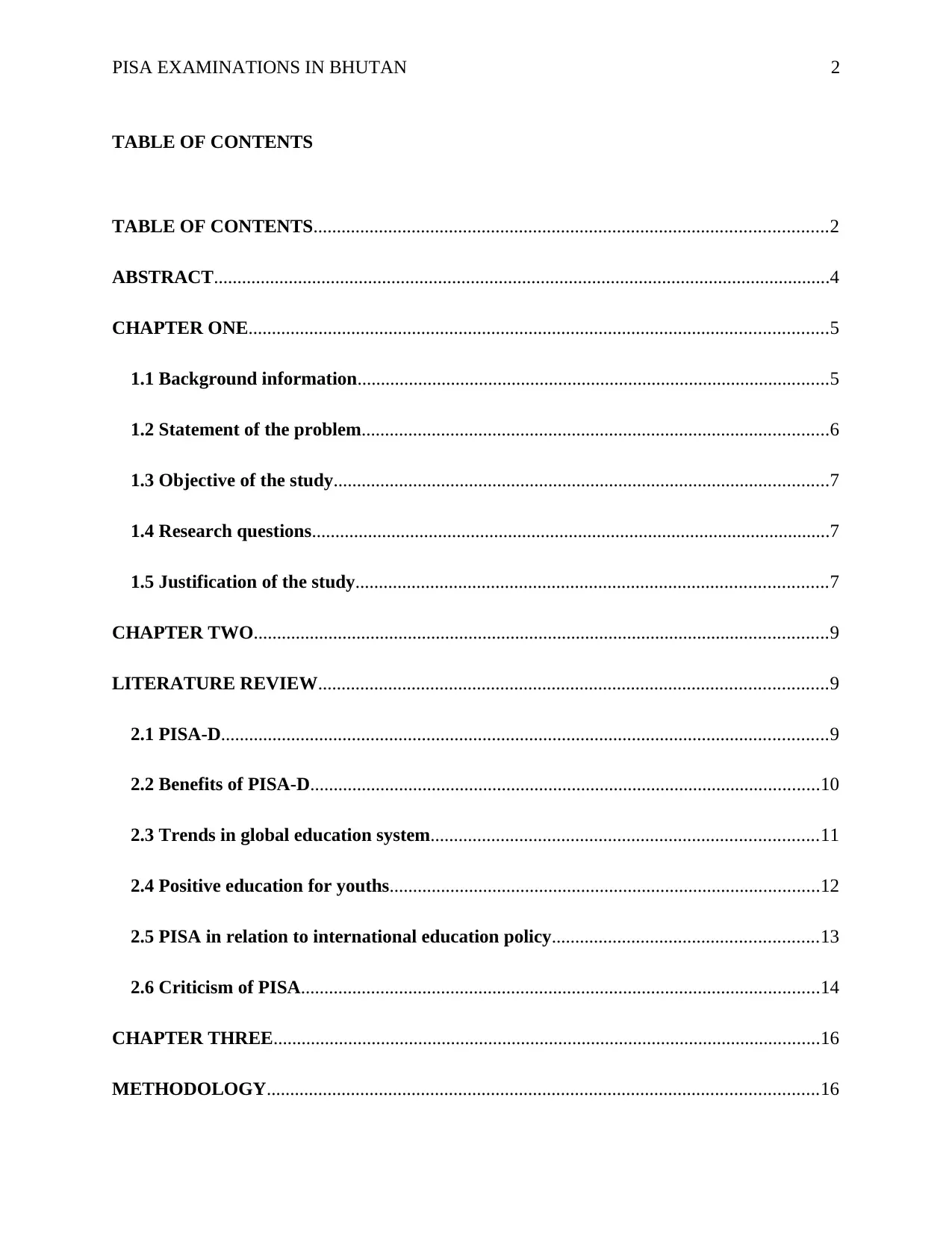
PISA EXAMINATIONS IN BHUTAN 2
TABLE OF CONTENTS
TABLE OF CONTENTS..............................................................................................................2
ABSTRACT....................................................................................................................................4
CHAPTER ONE............................................................................................................................5
1.1 Background information.....................................................................................................5
1.2 Statement of the problem....................................................................................................6
1.3 Objective of the study..........................................................................................................7
1.4 Research questions...............................................................................................................7
1.5 Justification of the study.....................................................................................................7
CHAPTER TWO...........................................................................................................................9
LITERATURE REVIEW.............................................................................................................9
2.1 PISA-D..................................................................................................................................9
2.2 Benefits of PISA-D.............................................................................................................10
2.3 Trends in global education system...................................................................................11
2.4 Positive education for youths............................................................................................12
2.5 PISA in relation to international education policy.........................................................13
2.6 Criticism of PISA...............................................................................................................14
CHAPTER THREE.....................................................................................................................16
METHODOLOGY......................................................................................................................16
TABLE OF CONTENTS
TABLE OF CONTENTS..............................................................................................................2
ABSTRACT....................................................................................................................................4
CHAPTER ONE............................................................................................................................5
1.1 Background information.....................................................................................................5
1.2 Statement of the problem....................................................................................................6
1.3 Objective of the study..........................................................................................................7
1.4 Research questions...............................................................................................................7
1.5 Justification of the study.....................................................................................................7
CHAPTER TWO...........................................................................................................................9
LITERATURE REVIEW.............................................................................................................9
2.1 PISA-D..................................................................................................................................9
2.2 Benefits of PISA-D.............................................................................................................10
2.3 Trends in global education system...................................................................................11
2.4 Positive education for youths............................................................................................12
2.5 PISA in relation to international education policy.........................................................13
2.6 Criticism of PISA...............................................................................................................14
CHAPTER THREE.....................................................................................................................16
METHODOLOGY......................................................................................................................16
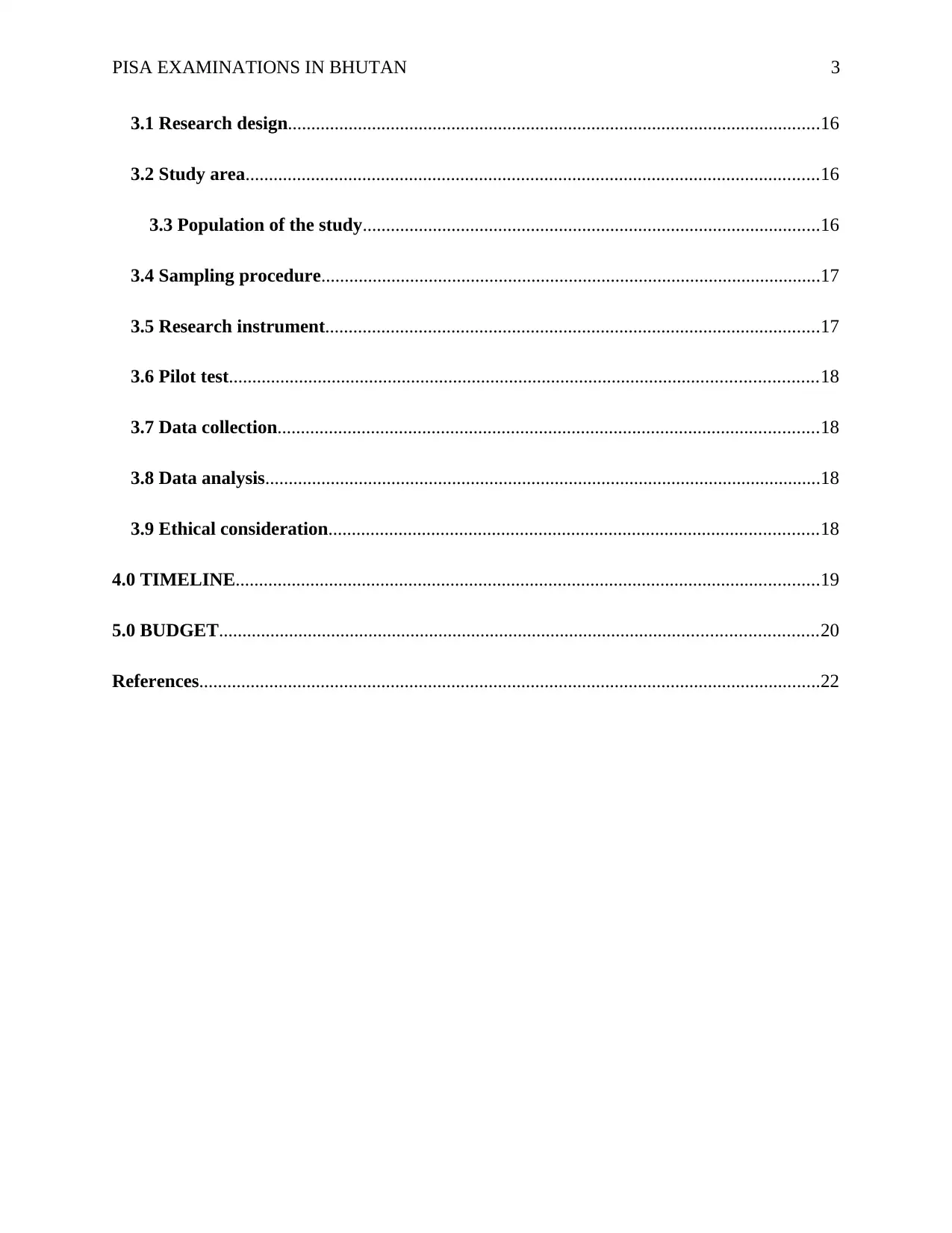
PISA EXAMINATIONS IN BHUTAN 3
3.1 Research design..................................................................................................................16
3.2 Study area...........................................................................................................................16
3.3 Population of the study..................................................................................................16
3.4 Sampling procedure...........................................................................................................17
3.5 Research instrument..........................................................................................................17
3.6 Pilot test..............................................................................................................................18
3.7 Data collection....................................................................................................................18
3.8 Data analysis.......................................................................................................................18
3.9 Ethical consideration.........................................................................................................18
4.0 TIMELINE.............................................................................................................................19
5.0 BUDGET................................................................................................................................20
References.....................................................................................................................................22
3.1 Research design..................................................................................................................16
3.2 Study area...........................................................................................................................16
3.3 Population of the study..................................................................................................16
3.4 Sampling procedure...........................................................................................................17
3.5 Research instrument..........................................................................................................17
3.6 Pilot test..............................................................................................................................18
3.7 Data collection....................................................................................................................18
3.8 Data analysis.......................................................................................................................18
3.9 Ethical consideration.........................................................................................................18
4.0 TIMELINE.............................................................................................................................19
5.0 BUDGET................................................................................................................................20
References.....................................................................................................................................22
⊘ This is a preview!⊘
Do you want full access?
Subscribe today to unlock all pages.

Trusted by 1+ million students worldwide
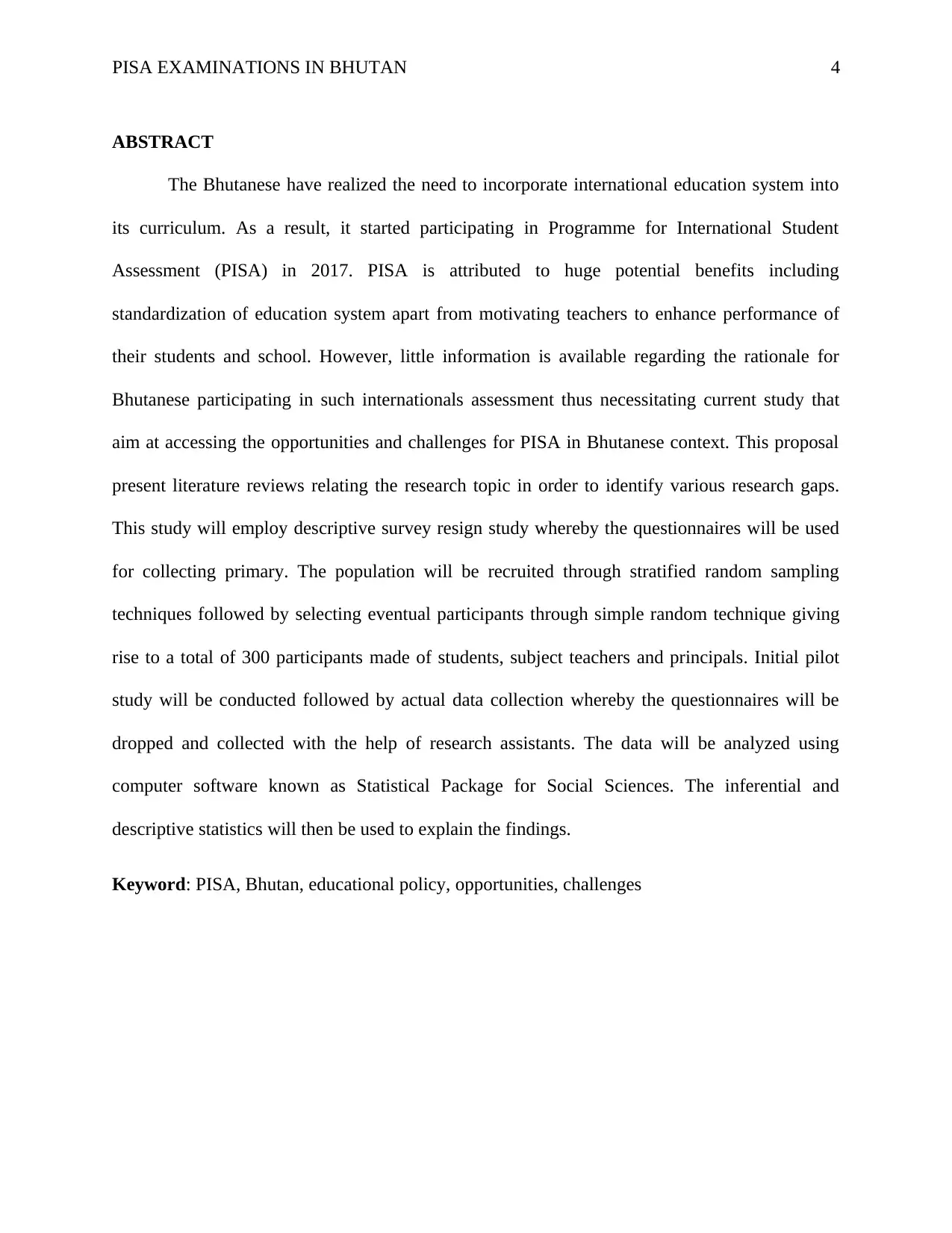
PISA EXAMINATIONS IN BHUTAN 4
ABSTRACT
The Bhutanese have realized the need to incorporate international education system into
its curriculum. As a result, it started participating in Programme for International Student
Assessment (PISA) in 2017. PISA is attributed to huge potential benefits including
standardization of education system apart from motivating teachers to enhance performance of
their students and school. However, little information is available regarding the rationale for
Bhutanese participating in such internationals assessment thus necessitating current study that
aim at accessing the opportunities and challenges for PISA in Bhutanese context. This proposal
present literature reviews relating the research topic in order to identify various research gaps.
This study will employ descriptive survey resign study whereby the questionnaires will be used
for collecting primary. The population will be recruited through stratified random sampling
techniques followed by selecting eventual participants through simple random technique giving
rise to a total of 300 participants made of students, subject teachers and principals. Initial pilot
study will be conducted followed by actual data collection whereby the questionnaires will be
dropped and collected with the help of research assistants. The data will be analyzed using
computer software known as Statistical Package for Social Sciences. The inferential and
descriptive statistics will then be used to explain the findings.
Keyword: PISA, Bhutan, educational policy, opportunities, challenges
ABSTRACT
The Bhutanese have realized the need to incorporate international education system into
its curriculum. As a result, it started participating in Programme for International Student
Assessment (PISA) in 2017. PISA is attributed to huge potential benefits including
standardization of education system apart from motivating teachers to enhance performance of
their students and school. However, little information is available regarding the rationale for
Bhutanese participating in such internationals assessment thus necessitating current study that
aim at accessing the opportunities and challenges for PISA in Bhutanese context. This proposal
present literature reviews relating the research topic in order to identify various research gaps.
This study will employ descriptive survey resign study whereby the questionnaires will be used
for collecting primary. The population will be recruited through stratified random sampling
techniques followed by selecting eventual participants through simple random technique giving
rise to a total of 300 participants made of students, subject teachers and principals. Initial pilot
study will be conducted followed by actual data collection whereby the questionnaires will be
dropped and collected with the help of research assistants. The data will be analyzed using
computer software known as Statistical Package for Social Sciences. The inferential and
descriptive statistics will then be used to explain the findings.
Keyword: PISA, Bhutan, educational policy, opportunities, challenges
Paraphrase This Document
Need a fresh take? Get an instant paraphrase of this document with our AI Paraphraser
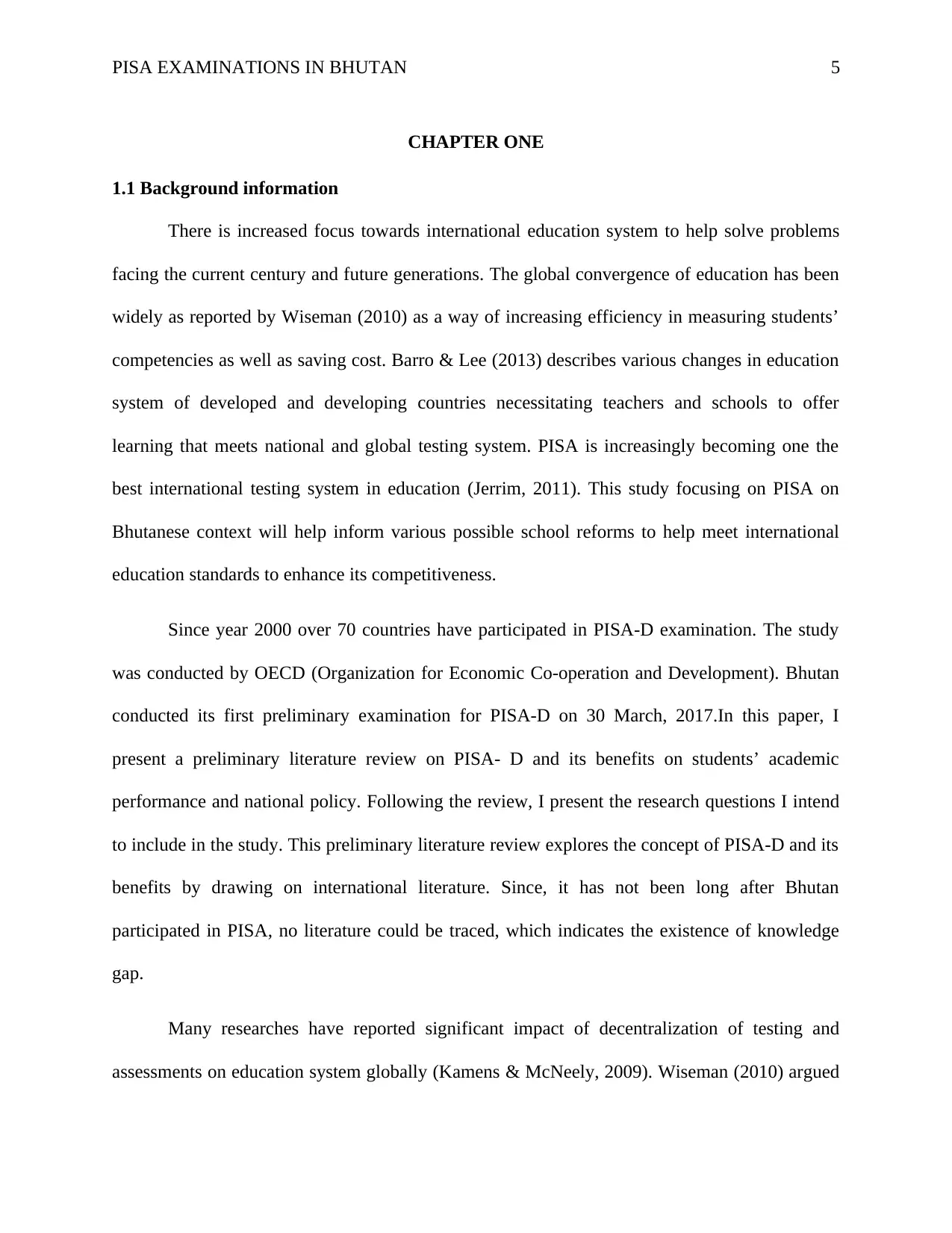
PISA EXAMINATIONS IN BHUTAN 5
CHAPTER ONE
1.1 Background information
There is increased focus towards international education system to help solve problems
facing the current century and future generations. The global convergence of education has been
widely as reported by Wiseman (2010) as a way of increasing efficiency in measuring students’
competencies as well as saving cost. Barro & Lee (2013) describes various changes in education
system of developed and developing countries necessitating teachers and schools to offer
learning that meets national and global testing system. PISA is increasingly becoming one the
best international testing system in education (Jerrim, 2011). This study focusing on PISA on
Bhutanese context will help inform various possible school reforms to help meet international
education standards to enhance its competitiveness.
Since year 2000 over 70 countries have participated in PISA-D examination. The study
was conducted by OECD (Organization for Economic Co-operation and Development). Bhutan
conducted its first preliminary examination for PISA-D on 30 March, 2017.In this paper, I
present a preliminary literature review on PISA- D and its benefits on students’ academic
performance and national policy. Following the review, I present the research questions I intend
to include in the study. This preliminary literature review explores the concept of PISA-D and its
benefits by drawing on international literature. Since, it has not been long after Bhutan
participated in PISA, no literature could be traced, which indicates the existence of knowledge
gap.
Many researches have reported significant impact of decentralization of testing and
assessments on education system globally (Kamens & McNeely, 2009). Wiseman (2010) argued
CHAPTER ONE
1.1 Background information
There is increased focus towards international education system to help solve problems
facing the current century and future generations. The global convergence of education has been
widely as reported by Wiseman (2010) as a way of increasing efficiency in measuring students’
competencies as well as saving cost. Barro & Lee (2013) describes various changes in education
system of developed and developing countries necessitating teachers and schools to offer
learning that meets national and global testing system. PISA is increasingly becoming one the
best international testing system in education (Jerrim, 2011). This study focusing on PISA on
Bhutanese context will help inform various possible school reforms to help meet international
education standards to enhance its competitiveness.
Since year 2000 over 70 countries have participated in PISA-D examination. The study
was conducted by OECD (Organization for Economic Co-operation and Development). Bhutan
conducted its first preliminary examination for PISA-D on 30 March, 2017.In this paper, I
present a preliminary literature review on PISA- D and its benefits on students’ academic
performance and national policy. Following the review, I present the research questions I intend
to include in the study. This preliminary literature review explores the concept of PISA-D and its
benefits by drawing on international literature. Since, it has not been long after Bhutan
participated in PISA, no literature could be traced, which indicates the existence of knowledge
gap.
Many researches have reported significant impact of decentralization of testing and
assessments on education system globally (Kamens & McNeely, 2009). Wiseman (2010) argued
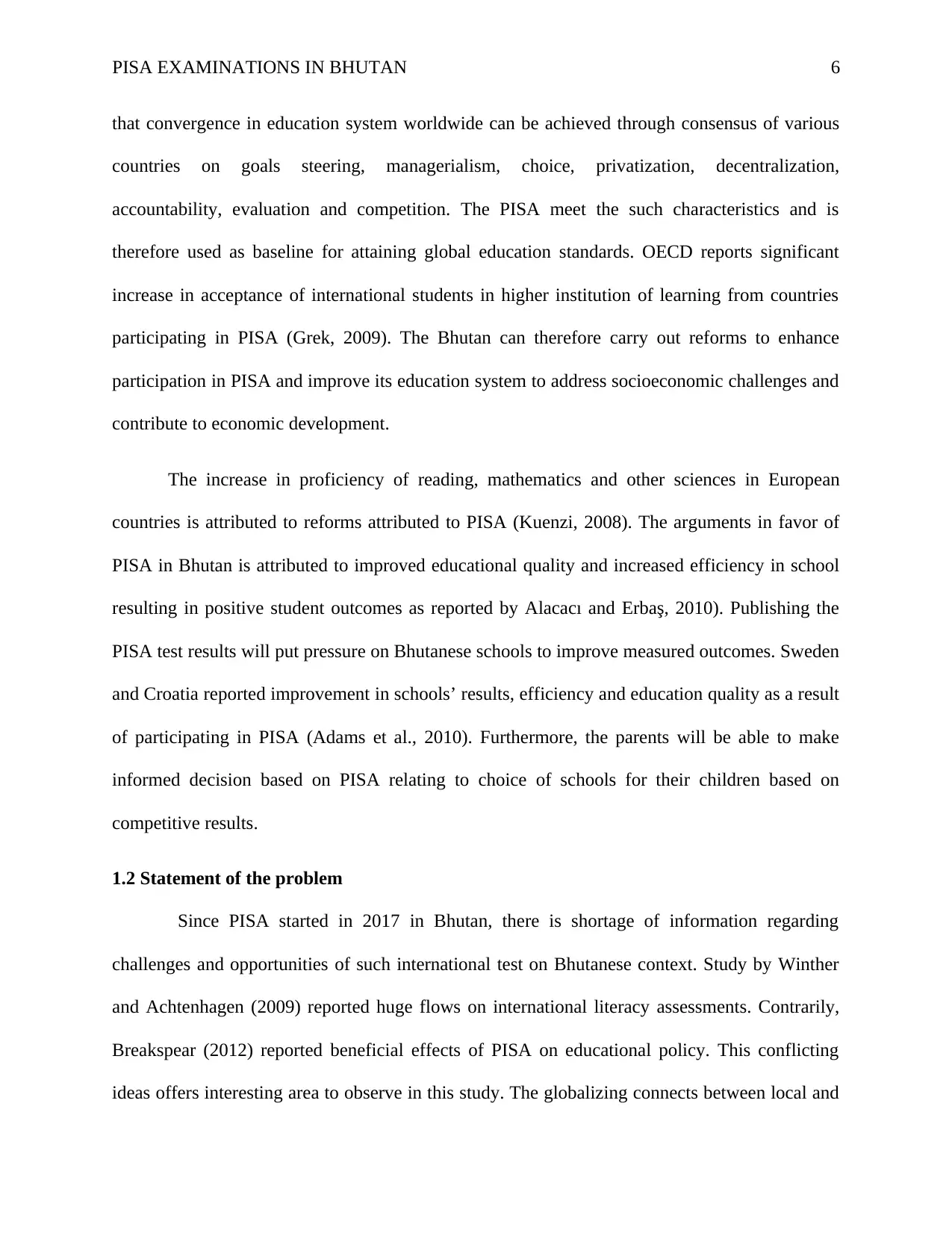
PISA EXAMINATIONS IN BHUTAN 6
that convergence in education system worldwide can be achieved through consensus of various
countries on goals steering, managerialism, choice, privatization, decentralization,
accountability, evaluation and competition. The PISA meet the such characteristics and is
therefore used as baseline for attaining global education standards. OECD reports significant
increase in acceptance of international students in higher institution of learning from countries
participating in PISA (Grek, 2009). The Bhutan can therefore carry out reforms to enhance
participation in PISA and improve its education system to address socioeconomic challenges and
contribute to economic development.
The increase in proficiency of reading, mathematics and other sciences in European
countries is attributed to reforms attributed to PISA (Kuenzi, 2008). The arguments in favor of
PISA in Bhutan is attributed to improved educational quality and increased efficiency in school
resulting in positive student outcomes as reported by Alacacı and Erbaş, 2010). Publishing the
PISA test results will put pressure on Bhutanese schools to improve measured outcomes. Sweden
and Croatia reported improvement in schools’ results, efficiency and education quality as a result
of participating in PISA (Adams et al., 2010). Furthermore, the parents will be able to make
informed decision based on PISA relating to choice of schools for their children based on
competitive results.
1.2 Statement of the problem
Since PISA started in 2017 in Bhutan, there is shortage of information regarding
challenges and opportunities of such international test on Bhutanese context. Study by Winther
and Achtenhagen (2009) reported huge flows on international literacy assessments. Contrarily,
Breakspear (2012) reported beneficial effects of PISA on educational policy. This conflicting
ideas offers interesting area to observe in this study. The globalizing connects between local and
that convergence in education system worldwide can be achieved through consensus of various
countries on goals steering, managerialism, choice, privatization, decentralization,
accountability, evaluation and competition. The PISA meet the such characteristics and is
therefore used as baseline for attaining global education standards. OECD reports significant
increase in acceptance of international students in higher institution of learning from countries
participating in PISA (Grek, 2009). The Bhutan can therefore carry out reforms to enhance
participation in PISA and improve its education system to address socioeconomic challenges and
contribute to economic development.
The increase in proficiency of reading, mathematics and other sciences in European
countries is attributed to reforms attributed to PISA (Kuenzi, 2008). The arguments in favor of
PISA in Bhutan is attributed to improved educational quality and increased efficiency in school
resulting in positive student outcomes as reported by Alacacı and Erbaş, 2010). Publishing the
PISA test results will put pressure on Bhutanese schools to improve measured outcomes. Sweden
and Croatia reported improvement in schools’ results, efficiency and education quality as a result
of participating in PISA (Adams et al., 2010). Furthermore, the parents will be able to make
informed decision based on PISA relating to choice of schools for their children based on
competitive results.
1.2 Statement of the problem
Since PISA started in 2017 in Bhutan, there is shortage of information regarding
challenges and opportunities of such international test on Bhutanese context. Study by Winther
and Achtenhagen (2009) reported huge flows on international literacy assessments. Contrarily,
Breakspear (2012) reported beneficial effects of PISA on educational policy. This conflicting
ideas offers interesting area to observe in this study. The globalizing connects between local and
⊘ This is a preview!⊘
Do you want full access?
Subscribe today to unlock all pages.

Trusted by 1+ million students worldwide
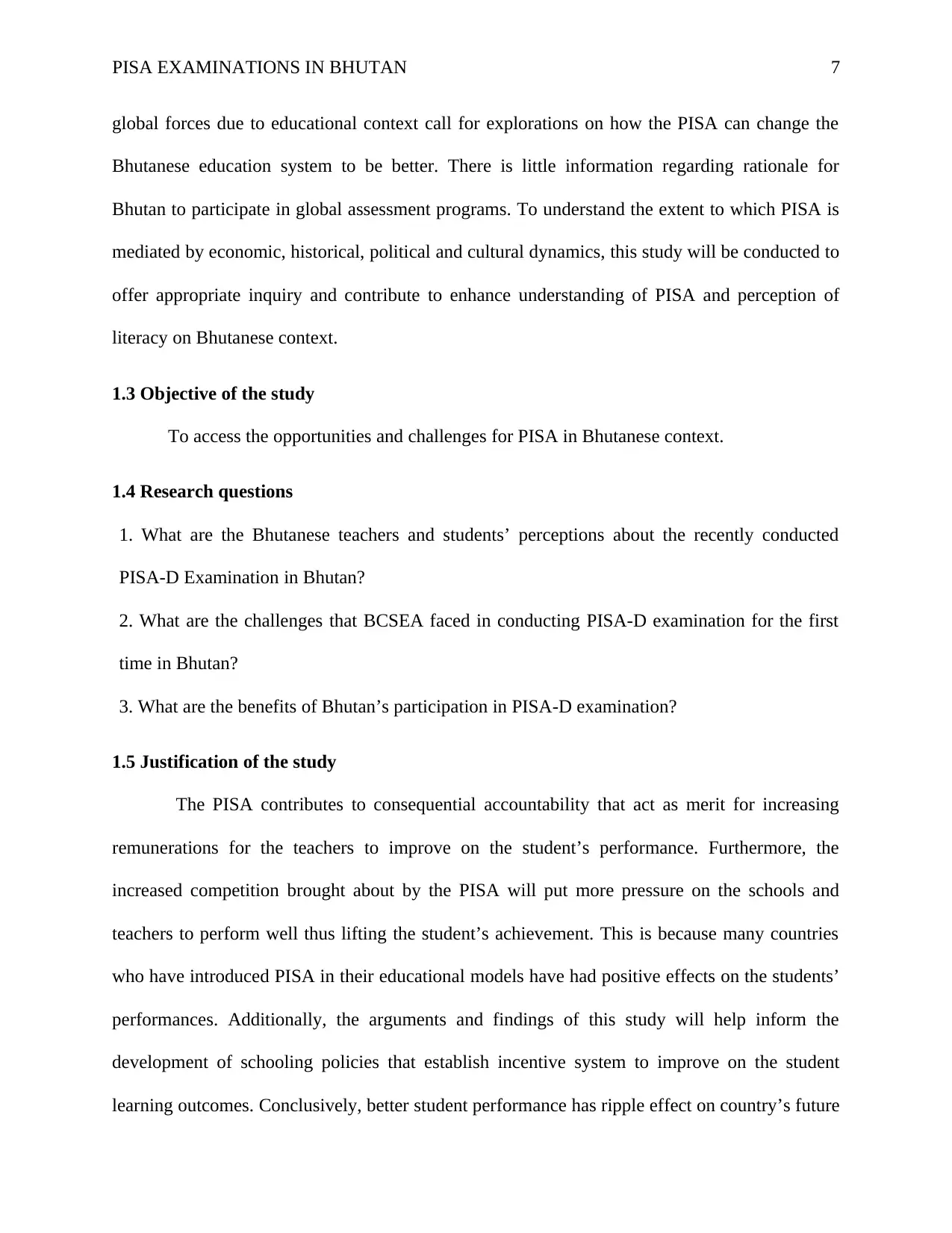
PISA EXAMINATIONS IN BHUTAN 7
global forces due to educational context call for explorations on how the PISA can change the
Bhutanese education system to be better. There is little information regarding rationale for
Bhutan to participate in global assessment programs. To understand the extent to which PISA is
mediated by economic, historical, political and cultural dynamics, this study will be conducted to
offer appropriate inquiry and contribute to enhance understanding of PISA and perception of
literacy on Bhutanese context.
1.3 Objective of the study
To access the opportunities and challenges for PISA in Bhutanese context.
1.4 Research questions
1. What are the Bhutanese teachers and students’ perceptions about the recently conducted
PISA-D Examination in Bhutan?
2. What are the challenges that BCSEA faced in conducting PISA-D examination for the first
time in Bhutan?
3. What are the benefits of Bhutan’s participation in PISA-D examination?
1.5 Justification of the study
The PISA contributes to consequential accountability that act as merit for increasing
remunerations for the teachers to improve on the student’s performance. Furthermore, the
increased competition brought about by the PISA will put more pressure on the schools and
teachers to perform well thus lifting the student’s achievement. This is because many countries
who have introduced PISA in their educational models have had positive effects on the students’
performances. Additionally, the arguments and findings of this study will help inform the
development of schooling policies that establish incentive system to improve on the student
learning outcomes. Conclusively, better student performance has ripple effect on country’s future
global forces due to educational context call for explorations on how the PISA can change the
Bhutanese education system to be better. There is little information regarding rationale for
Bhutan to participate in global assessment programs. To understand the extent to which PISA is
mediated by economic, historical, political and cultural dynamics, this study will be conducted to
offer appropriate inquiry and contribute to enhance understanding of PISA and perception of
literacy on Bhutanese context.
1.3 Objective of the study
To access the opportunities and challenges for PISA in Bhutanese context.
1.4 Research questions
1. What are the Bhutanese teachers and students’ perceptions about the recently conducted
PISA-D Examination in Bhutan?
2. What are the challenges that BCSEA faced in conducting PISA-D examination for the first
time in Bhutan?
3. What are the benefits of Bhutan’s participation in PISA-D examination?
1.5 Justification of the study
The PISA contributes to consequential accountability that act as merit for increasing
remunerations for the teachers to improve on the student’s performance. Furthermore, the
increased competition brought about by the PISA will put more pressure on the schools and
teachers to perform well thus lifting the student’s achievement. This is because many countries
who have introduced PISA in their educational models have had positive effects on the students’
performances. Additionally, the arguments and findings of this study will help inform the
development of schooling policies that establish incentive system to improve on the student
learning outcomes. Conclusively, better student performance has ripple effect on country’s future
Paraphrase This Document
Need a fresh take? Get an instant paraphrase of this document with our AI Paraphraser

PISA EXAMINATIONS IN BHUTAN 8
economic and social performance. The criticism for current Bhutanese education system is that it
is placing more focus on test results thus narrowing scope of teaching to areas likely to be tested.
However, PISA encourages standardization of education system that stretches curriculum to
meet broader international education’s goals.
economic and social performance. The criticism for current Bhutanese education system is that it
is placing more focus on test results thus narrowing scope of teaching to areas likely to be tested.
However, PISA encourages standardization of education system that stretches curriculum to
meet broader international education’s goals.
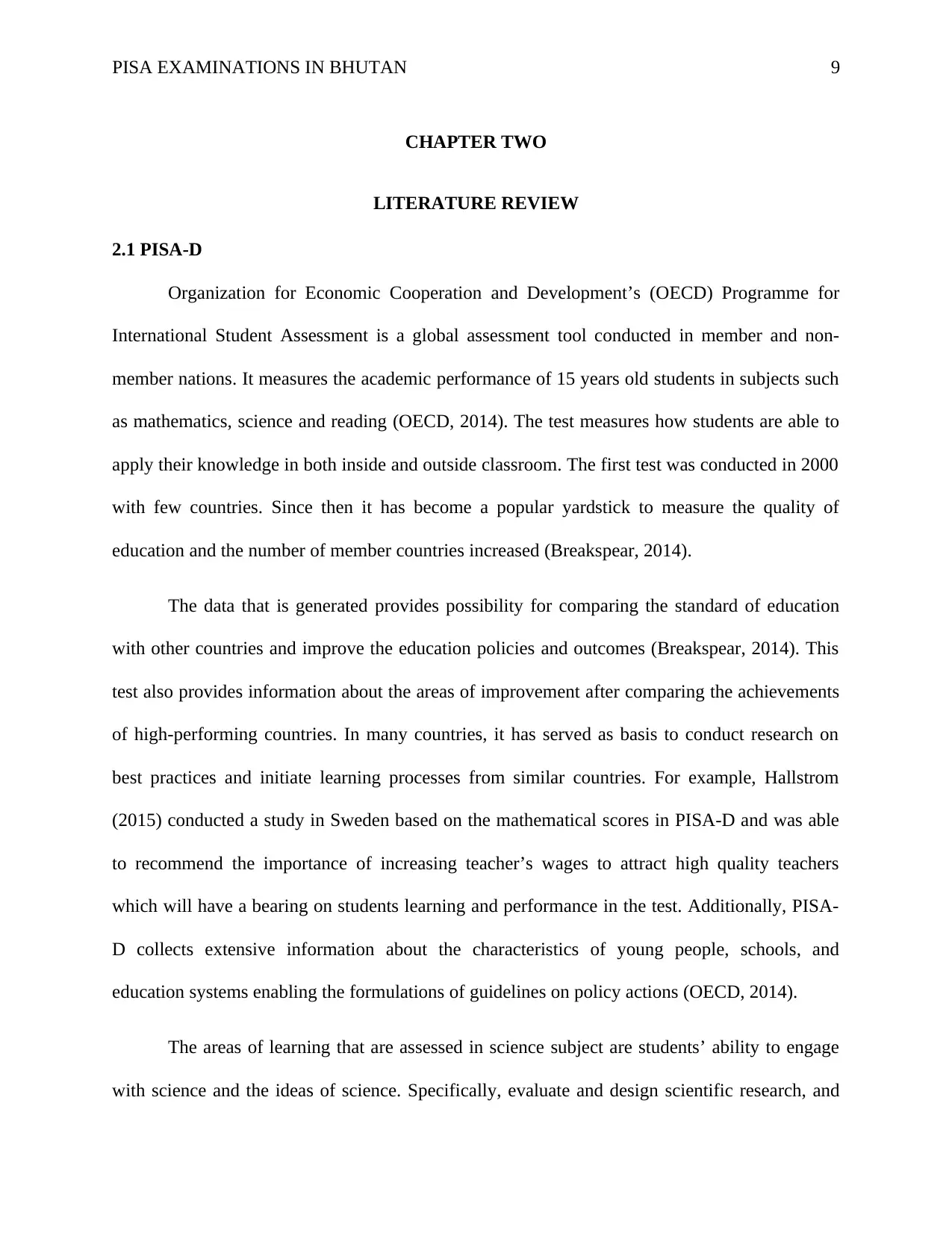
PISA EXAMINATIONS IN BHUTAN 9
CHAPTER TWO
LITERATURE REVIEW
2.1 PISA-D
Organization for Economic Cooperation and Development’s (OECD) Programme for
International Student Assessment is a global assessment tool conducted in member and non-
member nations. It measures the academic performance of 15 years old students in subjects such
as mathematics, science and reading (OECD, 2014). The test measures how students are able to
apply their knowledge in both inside and outside classroom. The first test was conducted in 2000
with few countries. Since then it has become a popular yardstick to measure the quality of
education and the number of member countries increased (Breakspear, 2014).
The data that is generated provides possibility for comparing the standard of education
with other countries and improve the education policies and outcomes (Breakspear, 2014). This
test also provides information about the areas of improvement after comparing the achievements
of high-performing countries. In many countries, it has served as basis to conduct research on
best practices and initiate learning processes from similar countries. For example, Hallstrom
(2015) conducted a study in Sweden based on the mathematical scores in PISA-D and was able
to recommend the importance of increasing teacher’s wages to attract high quality teachers
which will have a bearing on students learning and performance in the test. Additionally, PISA-
D collects extensive information about the characteristics of young people, schools, and
education systems enabling the formulations of guidelines on policy actions (OECD, 2014).
The areas of learning that are assessed in science subject are students’ ability to engage
with science and the ideas of science. Specifically, evaluate and design scientific research, and
CHAPTER TWO
LITERATURE REVIEW
2.1 PISA-D
Organization for Economic Cooperation and Development’s (OECD) Programme for
International Student Assessment is a global assessment tool conducted in member and non-
member nations. It measures the academic performance of 15 years old students in subjects such
as mathematics, science and reading (OECD, 2014). The test measures how students are able to
apply their knowledge in both inside and outside classroom. The first test was conducted in 2000
with few countries. Since then it has become a popular yardstick to measure the quality of
education and the number of member countries increased (Breakspear, 2014).
The data that is generated provides possibility for comparing the standard of education
with other countries and improve the education policies and outcomes (Breakspear, 2014). This
test also provides information about the areas of improvement after comparing the achievements
of high-performing countries. In many countries, it has served as basis to conduct research on
best practices and initiate learning processes from similar countries. For example, Hallstrom
(2015) conducted a study in Sweden based on the mathematical scores in PISA-D and was able
to recommend the importance of increasing teacher’s wages to attract high quality teachers
which will have a bearing on students learning and performance in the test. Additionally, PISA-
D collects extensive information about the characteristics of young people, schools, and
education systems enabling the formulations of guidelines on policy actions (OECD, 2014).
The areas of learning that are assessed in science subject are students’ ability to engage
with science and the ideas of science. Specifically, evaluate and design scientific research, and
⊘ This is a preview!⊘
Do you want full access?
Subscribe today to unlock all pages.

Trusted by 1+ million students worldwide
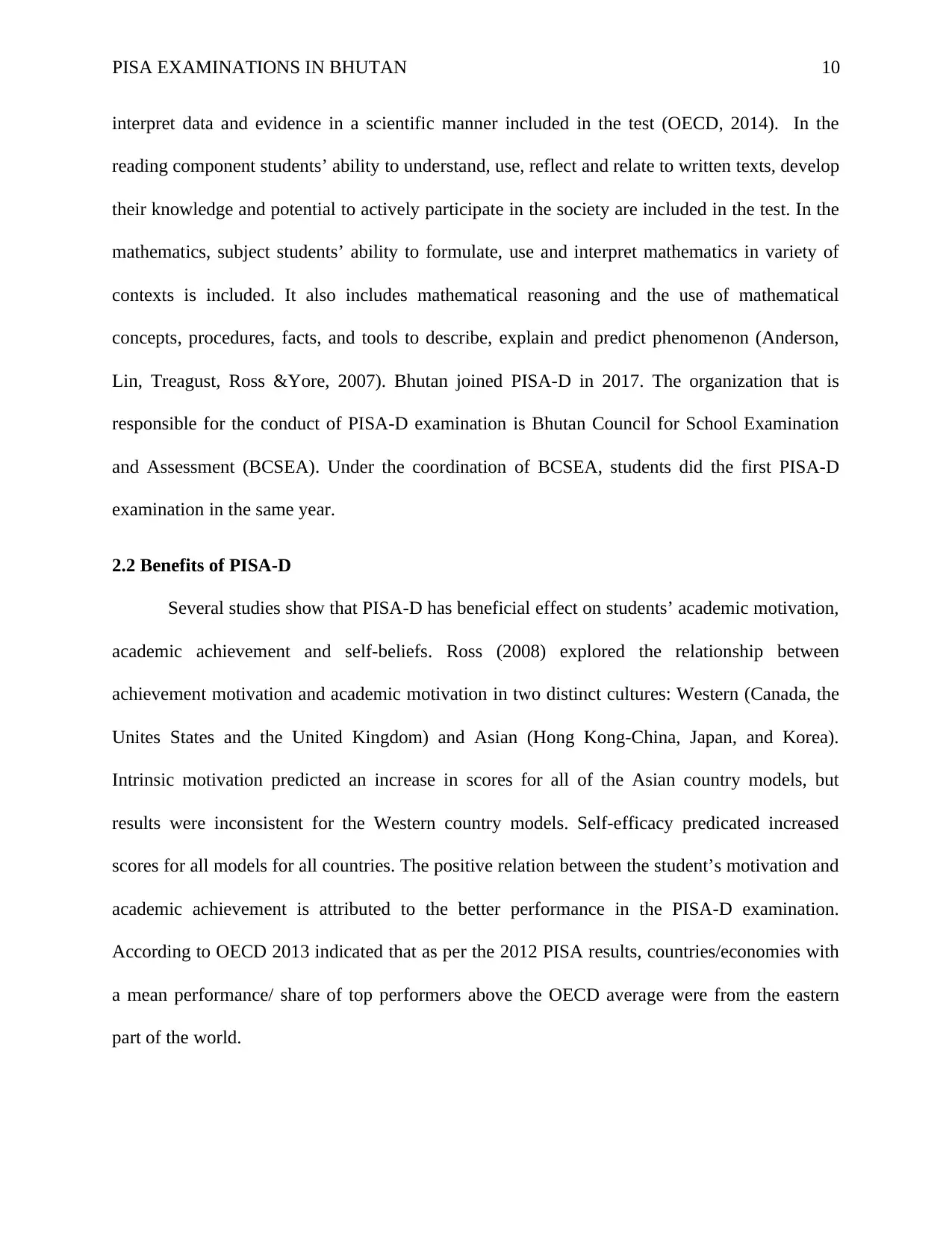
PISA EXAMINATIONS IN BHUTAN 10
interpret data and evidence in a scientific manner included in the test (OECD, 2014). In the
reading component students’ ability to understand, use, reflect and relate to written texts, develop
their knowledge and potential to actively participate in the society are included in the test. In the
mathematics, subject students’ ability to formulate, use and interpret mathematics in variety of
contexts is included. It also includes mathematical reasoning and the use of mathematical
concepts, procedures, facts, and tools to describe, explain and predict phenomenon (Anderson,
Lin, Treagust, Ross &Yore, 2007). Bhutan joined PISA-D in 2017. The organization that is
responsible for the conduct of PISA-D examination is Bhutan Council for School Examination
and Assessment (BCSEA). Under the coordination of BCSEA, students did the first PISA-D
examination in the same year.
2.2 Benefits of PISA-D
Several studies show that PISA-D has beneficial effect on students’ academic motivation,
academic achievement and self-beliefs. Ross (2008) explored the relationship between
achievement motivation and academic motivation in two distinct cultures: Western (Canada, the
Unites States and the United Kingdom) and Asian (Hong Kong-China, Japan, and Korea).
Intrinsic motivation predicted an increase in scores for all of the Asian country models, but
results were inconsistent for the Western country models. Self-efficacy predicated increased
scores for all models for all countries. The positive relation between the student’s motivation and
academic achievement is attributed to the better performance in the PISA-D examination.
According to OECD 2013 indicated that as per the 2012 PISA results, countries/economies with
a mean performance/ share of top performers above the OECD average were from the eastern
part of the world.
interpret data and evidence in a scientific manner included in the test (OECD, 2014). In the
reading component students’ ability to understand, use, reflect and relate to written texts, develop
their knowledge and potential to actively participate in the society are included in the test. In the
mathematics, subject students’ ability to formulate, use and interpret mathematics in variety of
contexts is included. It also includes mathematical reasoning and the use of mathematical
concepts, procedures, facts, and tools to describe, explain and predict phenomenon (Anderson,
Lin, Treagust, Ross &Yore, 2007). Bhutan joined PISA-D in 2017. The organization that is
responsible for the conduct of PISA-D examination is Bhutan Council for School Examination
and Assessment (BCSEA). Under the coordination of BCSEA, students did the first PISA-D
examination in the same year.
2.2 Benefits of PISA-D
Several studies show that PISA-D has beneficial effect on students’ academic motivation,
academic achievement and self-beliefs. Ross (2008) explored the relationship between
achievement motivation and academic motivation in two distinct cultures: Western (Canada, the
Unites States and the United Kingdom) and Asian (Hong Kong-China, Japan, and Korea).
Intrinsic motivation predicted an increase in scores for all of the Asian country models, but
results were inconsistent for the Western country models. Self-efficacy predicated increased
scores for all models for all countries. The positive relation between the student’s motivation and
academic achievement is attributed to the better performance in the PISA-D examination.
According to OECD 2013 indicated that as per the 2012 PISA results, countries/economies with
a mean performance/ share of top performers above the OECD average were from the eastern
part of the world.
Paraphrase This Document
Need a fresh take? Get an instant paraphrase of this document with our AI Paraphraser
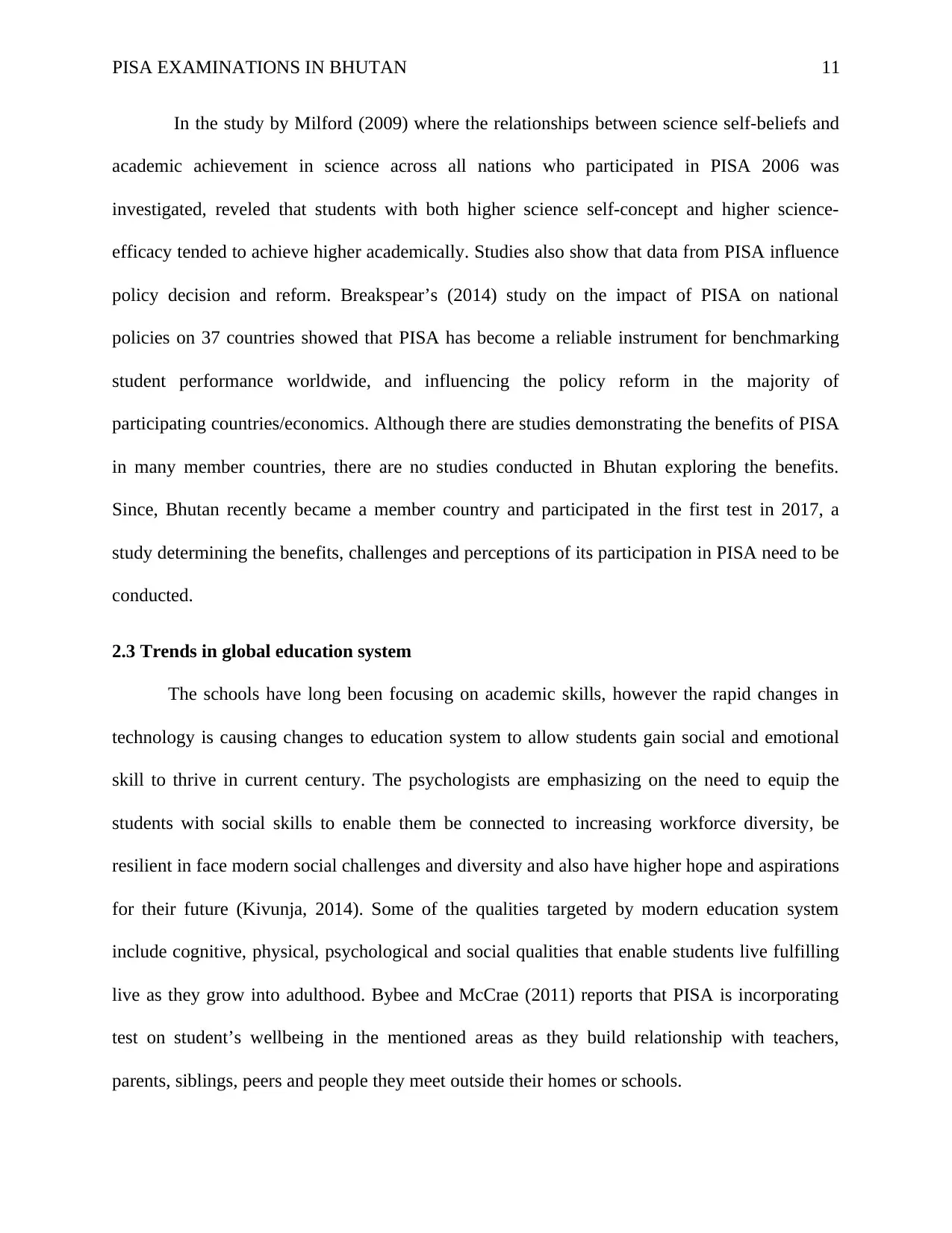
PISA EXAMINATIONS IN BHUTAN 11
In the study by Milford (2009) where the relationships between science self-beliefs and
academic achievement in science across all nations who participated in PISA 2006 was
investigated, reveled that students with both higher science self-concept and higher science-
efficacy tended to achieve higher academically. Studies also show that data from PISA influence
policy decision and reform. Breakspear’s (2014) study on the impact of PISA on national
policies on 37 countries showed that PISA has become a reliable instrument for benchmarking
student performance worldwide, and influencing the policy reform in the majority of
participating countries/economics. Although there are studies demonstrating the benefits of PISA
in many member countries, there are no studies conducted in Bhutan exploring the benefits.
Since, Bhutan recently became a member country and participated in the first test in 2017, a
study determining the benefits, challenges and perceptions of its participation in PISA need to be
conducted.
2.3 Trends in global education system
The schools have long been focusing on academic skills, however the rapid changes in
technology is causing changes to education system to allow students gain social and emotional
skill to thrive in current century. The psychologists are emphasizing on the need to equip the
students with social skills to enable them be connected to increasing workforce diversity, be
resilient in face modern social challenges and diversity and also have higher hope and aspirations
for their future (Kivunja, 2014). Some of the qualities targeted by modern education system
include cognitive, physical, psychological and social qualities that enable students live fulfilling
live as they grow into adulthood. Bybee and McCrae (2011) reports that PISA is incorporating
test on student’s wellbeing in the mentioned areas as they build relationship with teachers,
parents, siblings, peers and people they meet outside their homes or schools.
In the study by Milford (2009) where the relationships between science self-beliefs and
academic achievement in science across all nations who participated in PISA 2006 was
investigated, reveled that students with both higher science self-concept and higher science-
efficacy tended to achieve higher academically. Studies also show that data from PISA influence
policy decision and reform. Breakspear’s (2014) study on the impact of PISA on national
policies on 37 countries showed that PISA has become a reliable instrument for benchmarking
student performance worldwide, and influencing the policy reform in the majority of
participating countries/economics. Although there are studies demonstrating the benefits of PISA
in many member countries, there are no studies conducted in Bhutan exploring the benefits.
Since, Bhutan recently became a member country and participated in the first test in 2017, a
study determining the benefits, challenges and perceptions of its participation in PISA need to be
conducted.
2.3 Trends in global education system
The schools have long been focusing on academic skills, however the rapid changes in
technology is causing changes to education system to allow students gain social and emotional
skill to thrive in current century. The psychologists are emphasizing on the need to equip the
students with social skills to enable them be connected to increasing workforce diversity, be
resilient in face modern social challenges and diversity and also have higher hope and aspirations
for their future (Kivunja, 2014). Some of the qualities targeted by modern education system
include cognitive, physical, psychological and social qualities that enable students live fulfilling
live as they grow into adulthood. Bybee and McCrae (2011) reports that PISA is incorporating
test on student’s wellbeing in the mentioned areas as they build relationship with teachers,
parents, siblings, peers and people they meet outside their homes or schools.
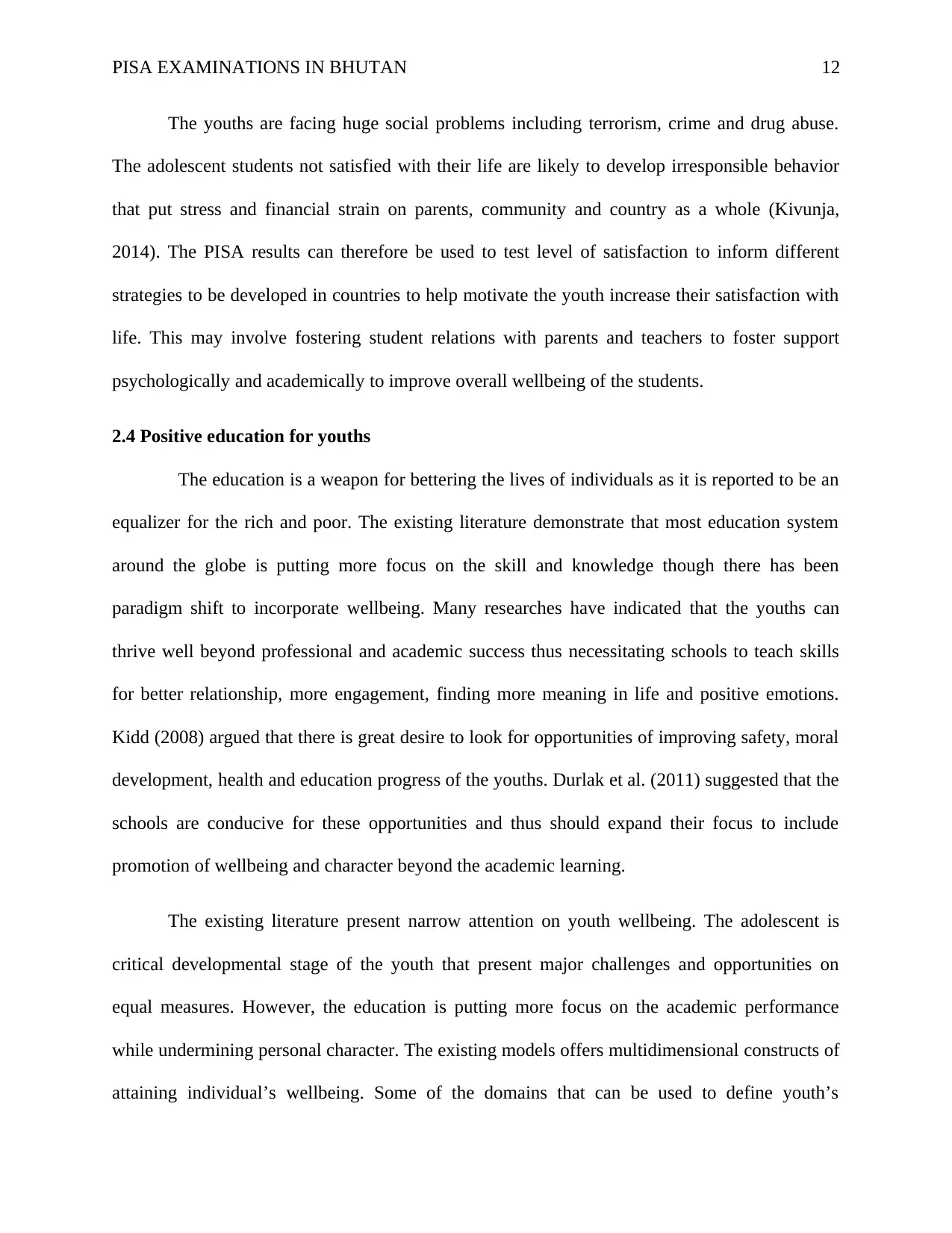
PISA EXAMINATIONS IN BHUTAN 12
The youths are facing huge social problems including terrorism, crime and drug abuse.
The adolescent students not satisfied with their life are likely to develop irresponsible behavior
that put stress and financial strain on parents, community and country as a whole (Kivunja,
2014). The PISA results can therefore be used to test level of satisfaction to inform different
strategies to be developed in countries to help motivate the youth increase their satisfaction with
life. This may involve fostering student relations with parents and teachers to foster support
psychologically and academically to improve overall wellbeing of the students.
2.4 Positive education for youths
The education is a weapon for bettering the lives of individuals as it is reported to be an
equalizer for the rich and poor. The existing literature demonstrate that most education system
around the globe is putting more focus on the skill and knowledge though there has been
paradigm shift to incorporate wellbeing. Many researches have indicated that the youths can
thrive well beyond professional and academic success thus necessitating schools to teach skills
for better relationship, more engagement, finding more meaning in life and positive emotions.
Kidd (2008) argued that there is great desire to look for opportunities of improving safety, moral
development, health and education progress of the youths. Durlak et al. (2011) suggested that the
schools are conducive for these opportunities and thus should expand their focus to include
promotion of wellbeing and character beyond the academic learning.
The existing literature present narrow attention on youth wellbeing. The adolescent is
critical developmental stage of the youth that present major challenges and opportunities on
equal measures. However, the education is putting more focus on the academic performance
while undermining personal character. The existing models offers multidimensional constructs of
attaining individual’s wellbeing. Some of the domains that can be used to define youth’s
The youths are facing huge social problems including terrorism, crime and drug abuse.
The adolescent students not satisfied with their life are likely to develop irresponsible behavior
that put stress and financial strain on parents, community and country as a whole (Kivunja,
2014). The PISA results can therefore be used to test level of satisfaction to inform different
strategies to be developed in countries to help motivate the youth increase their satisfaction with
life. This may involve fostering student relations with parents and teachers to foster support
psychologically and academically to improve overall wellbeing of the students.
2.4 Positive education for youths
The education is a weapon for bettering the lives of individuals as it is reported to be an
equalizer for the rich and poor. The existing literature demonstrate that most education system
around the globe is putting more focus on the skill and knowledge though there has been
paradigm shift to incorporate wellbeing. Many researches have indicated that the youths can
thrive well beyond professional and academic success thus necessitating schools to teach skills
for better relationship, more engagement, finding more meaning in life and positive emotions.
Kidd (2008) argued that there is great desire to look for opportunities of improving safety, moral
development, health and education progress of the youths. Durlak et al. (2011) suggested that the
schools are conducive for these opportunities and thus should expand their focus to include
promotion of wellbeing and character beyond the academic learning.
The existing literature present narrow attention on youth wellbeing. The adolescent is
critical developmental stage of the youth that present major challenges and opportunities on
equal measures. However, the education is putting more focus on the academic performance
while undermining personal character. The existing models offers multidimensional constructs of
attaining individual’s wellbeing. Some of the domains that can be used to define youth’s
⊘ This is a preview!⊘
Do you want full access?
Subscribe today to unlock all pages.

Trusted by 1+ million students worldwide
1 out of 24
Related Documents
Your All-in-One AI-Powered Toolkit for Academic Success.
+13062052269
info@desklib.com
Available 24*7 on WhatsApp / Email
![[object Object]](/_next/static/media/star-bottom.7253800d.svg)
Unlock your academic potential
Copyright © 2020–2026 A2Z Services. All Rights Reserved. Developed and managed by ZUCOL.





